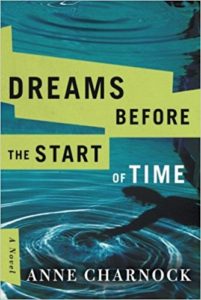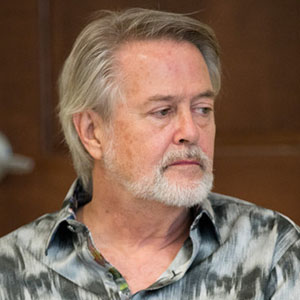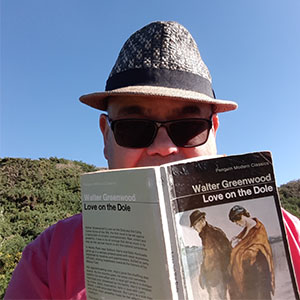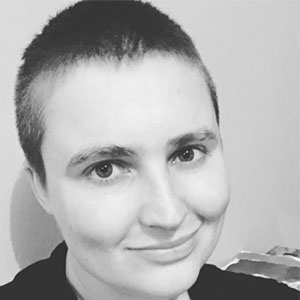
Dreams Before the Start of Time by Anne Charnock (47North)
 In a near-future London, Millie Dack places her hand on her belly to feel her baby kick, resolute in her decision to be a single parent. Across town, her closest friend—a hungover Toni Munroe—steps into the shower and places her hand on a medic console. The diagnosis is devastating.
In a near-future London, Millie Dack places her hand on her belly to feel her baby kick, resolute in her decision to be a single parent. Across town, her closest friend—a hungover Toni Munroe—steps into the shower and places her hand on a medic console. The diagnosis is devastating.
In this stunning, bittersweet family saga, Millie and Toni experience the aftershocks of human progress as their children and grandchildren embrace new ways of making babies. When infertility is a thing of the past, a man can create a child without a woman, a woman can create a child without a man, and artificial wombs eliminate the struggles of pregnancy. But what does it mean to be a parent? A child? A family?
Through a series of interconnected vignettes that spans five generations and three continents, this emotionally taut story explores the anxieties that arise when the science of fertility claims to deliver all the answers.
It has been short-listed for the 2018 Arthur C. Clarke award. A selection of our panel of shadow jurors respond to the novel below…
Gary K. Wolfe

Of the shortlisted novels I’ve read so far, Anne Charnock’s Dreams Before the Start of Time probably comes closest to earning some sort of SF award. It focuses clearly on a particular technology and—in a kind of narrative structure that is far less common in SF than it once was—traces the effects of that technology on a single extended family over the next century or so. More important, the central speculative element is reproductive technology, which—despite its obvious significance in imagining any future—has been all but ignored by much science fiction. (I can think of a few examples from Lois McMaster Bujold and Kim Stanley Robinson, but not much else.) So it gets points for the originality and weight of its central theme, and more points for its deeply character-based generational saga, tracing radically shifting ideas about parenting and responsibility through a succession of figures who range from the heroic to the—well, let’s say less than admirable, and exploring issues of parenting ranging from surrogacy to single-parent reproduction to designer genetic enhancements. And it advances its narrative largely through domestic scenes that play out like realistic fiction; there’s really only one important scientist in the book, Dr. Kristina Christophe, and the only scene that develops an estranged SF vibe is the one in which she shows Rudy and Simone around the incubation clinic, with its ranks of bottled fetuses at different stages of development.
But while tracing the effects of a single technology provides a clearly defined focus for a novel mostly built around character, it also leads to what increasingly seemed like a severely underimagined future when it came to anything else. There are a few passing references to exoskeletons, self-driving cars, one-seater “pods,” gardening droids, solar farms, etc., but if anything drastic happens in the next century or so, we don’t hear about it, and for the most part these families could be living the sort of privileged lives of the E.M. Forster characters that Kristina recalls reading about. When Kristina recalls her honeymoon in Venice in the mid to late 21st century, I found myself asking if Venice would even still be there at that time, and there seems precious little evidence of the effects of climate change in London, either. We don’t get a clear sense of political or economic arrangements, and while we can argue that this isn’t what the novel is about, any more than Forster’s novels were, Charnock’s setting, especially as we move a century or more into the future, ought not to be quite so familiar, nor should the 1990s-era attitudes of many of her characters. Maybe Charnock chooses to assume that the major shifts in the future will mostly be in the form of those personal-service inventions she does mention, but that seems rather trivial. At times, it’s a little like some of those Asimov or Bradbury stories set in a future that was essentially mid-20th century suburbia, but with robots.
So while I do regard this rather skeletal future as a drawback to Dreams Before the Start of Time, I don’t think it significantly reduces the novel’s power in exploring the issues it does choose to focus on. Like most of the other Clarke finalist novels, it’s characterized by decent prose and thoughtfully developed characters, but as time goes on it seems these characters ought to be more visibly shaped by the very technologies that Charnock wants to explore. In this sense, Charnock’s future is an important one, because her characters are increasingly the products of a world different from the one we’re living in. It’s a subtle kind of estrangement, revealed through shifting life choices rather than catastrophic changes, but it’s no less convincing for that.
Nick Hubble

When is it appropriate to judge an SF novel by the likelihood of the future that it extrapolates? With a work like Sea of Rust, it is obviously beside the point to query whether the depicted future might ever come to pass; it merely serves as the setting for the tale. However, surely it is valid to raise questions about a more serious and ostensibly realist work such as American War if we don’t believe the basic premise that a group of southern states would secede over the prohibition of gasoline? With Dreams before the Start of Time, it is certainly relevant to question the advances in reproductive strategy it portrays and the social consequences that would follow because these are fundamentally central to the novel. As far as I know (and I claim no scientific expertise beyond what I read in general media), what Charnock sets out in this respect is all reasonably plausible and therefore not an issue in itself. But there is a further question as to whether credibility in one aspect of extrapolation outweighs all other elements of the projected future. For example, will London still be above water in 2084, let alone in the twenty-second century? OK, I’m being slightly pedantic here as I’m not an ecocritic; I wouldn’t criticise a text purely for not factoring in worst-case climate scenarios. I think the wider point is that I don’t really believe the future as set out here because it seems too middle-class and utopian in a somewhat sterile way. I’m not sure life as we know it – i.e. the western middle-class lifestyle as established in the late twentieth century – has much future. To be honest, I’m not entirely confident in western civilisation making it to the end of the second decade of the twenty-first century without at least major social shifts and I don’t see these in this novel.
Don’t get me wrong, I mostly enjoyed reading the book. Furthermore, one might argue that the real point of writing extrapolative science fiction is to tell us something about the way we live now and Charnock does this very well as anyone who has read her previous novels would expect. Therefore, I love the section about how Freya Liddicoat is pursuing her business plan to be a street food vendor in Cornwall, while training her son to be a lifeguard and surf instructor. This all seems eminently sensible to me for someone without access to upper middle-class privilege; but not in 2120. It’s a strategy to be pursued now in 2018. In many ways, the novel highlights what is wrong with contemporary society in terms of social inequality, entrenched class divides, heteronormativity, and the threat of eugenics. Charnock draws attention to these issues in a non-didactic way but, for example, the very fact that a revolution in reproductive technologies is not shown as giving rise to a multiplicity of different sexual, gender and social identities is disappointing. Without this context, the representation of the ethical dimensions of reproductive choices is always at risk of collapsing into an ideologically-complicit portrayal of deviations from the ‘norm’ as self-serving in some way. This may well be a consequence mainly of the scientific and medical literature of the field but fiction should be a medium of challenge to such discourses. For these very reasons, however, I think it is a novel that will have some shelf life. The extrapolation in the novel will provoke engagement even if some of that engagement is criticism along the lines that I outline above. It does after all set out to engage with some of the complexity of the modern world and therefore opens up the possibility of imagining social change. In other words, it is not yet another post-apocalyptic dystopia and that is something that we can celebrate.
Alasdair Stuart

Millie Dack and Toni Munroe have very different views about pregnancy and family life. In a near future London, and across three generations of their respective families, those views resonate and alter as society quietly alters with them.
I’m really glad I read this immediately after Sea of Rust because I can’t think of a more drastic gear change. Where Cargill’s novel is all cinematic action and meditations about digital life and death, Charnock’s is a slow, ensured exploration of family edge somewhere along the ragged edge of the social singularity. One is broad and fast paced and expansive. The other is a tightly focused, deceptively hopeful and intimate portrayal of people living through constant, persistent change. The end result, with no insult intended to either book, is a little like mainlining the entire Mad Max trilogy and following it up with a month’s worth of Radio 4 Afternoon Plays. Both worth your time, but there’s not much common ground. And, as I’ve talked about elsewhere, in terms of the state of science fiction and a healthy shortlist, that’s extremely good news.
Plus there’s a lot to enjoy here. Charnock is exceptional at personal interaction and there are countless small kindnesses powering the novel. A late scene revolves around a character trying to start a small business after a less quietly horrifying period in detention. It hums with the polite hospitality and low level tension that drives seaside towns. Earlier, a family’s perceptions, obligations and power dynamics all orbit the surprisingly loaded issue of whether one of their sons should get a haircut.
If you’re looking for big action, it’s not here. If you’re looking for big epic science fictional elements, they, also are not here. But what is present on every page is a profoundly surprising thing; a collision between the exact sort of ‘litfic’ that runs from genre and genre in turn runs from, and an exploration of what happens when that world meets the early stages of societal evolution. Those stages absolutely do not reflect increasingly large elements of 21st century life and that’s an absolutely valid criticism of the novel.
But it may also be part of the point. The communities and people Charnock writes about here embody the same sort of inherent societal contradiction that views Doctor Who as ‘proper TV’ not science fiction, that votes for Brexit but still chats happily with its Polish barista. The well meaning, often complacent heart of British literary fiction is the polite middle class family drama and Charnock, here, delivers a well placed, emphatic kick to its core values. This is a story less about the correct application of science fiction and modern societal evolution as it is about dragging those Afternoon Plays and their characters, blinking and uncertain, out into a very different kind of light. In that regard, it’s successful and, as I said, even courageous. I’m much less convinced if that’s enough for it to win the award but, much like Sea of Rust, it speaks to both a change in genre fiction and a wide ranging shortlist. And that’s undeniably a good thing.
Samira Nadkarni
 I struggled to read Dreams Before the Start of Time and, though I made it through to the end, I don’t think I ever got to the point where it was anything but forcing myself through. I can never recommend this book for any sort of award in good conscience. I believe it to be quietly cruel in ways I’m not sure I’ve fully processed yet.
I struggled to read Dreams Before the Start of Time and, though I made it through to the end, I don’t think I ever got to the point where it was anything but forcing myself through. I can never recommend this book for any sort of award in good conscience. I believe it to be quietly cruel in ways I’m not sure I’ve fully processed yet.
Set in the future and working its way through roughly three generations of interconnected lives in its various chapters, Dreams Before the Start of Time uses surrogacy, genetic modification, and futuristic gestation technology to explore ideas of alienation, community, and human existence. By setting up the question of whether we could medically “fix” humanity and the changing effects on traditional nuclear family structures, the novel offers spaces for both traditional as well as non-traditional families and relationships, and the manner in which in-vitro fertilisation, or more futuristic medical options such as single-donor fertilization (with an artificially created egg or sperm) or “bottle babies” fertilised and gestated in individual tanks, affect family structures and socialisation on small and large scales. Part and parcel of this discussion is a repeated emphasis on the “cleaning up” of these biological components and pre and post natal genetic modifications to foetuses and children to create “better,” seemingly more advanced children. By the third generation of the novel, these circumstances are positioned as so mundane that any non-genetically modified child is seen as lacking, particularly if conceived and gestated in traditional biological methods. Dreams Before the Start of Time makes a point of neither lionising nor vilifying character choices in its exploration of genetic modification, class structure, or the resultant “underskilled underclass” who haven’t had pre or post-natal genetic modifications. Despite a focus on the hotly contested topics of reproductive technology and genetic modification, larger socio-political movements are entirely absent in the novel; as a result, the focus remains largely on individual characters rather on larger overviews of what these changes would herald in the U.K specifically, and the world more generally.
The problem for me starts here. Because, for me, the novel never truly questions its own basic premise of “fixing” people for the inherent range of ableist prejudices in/visibilised under the smooth veneer of futuristic technology and white middle class social alienation.[1] The novel appears predicated on the assumption that genetic modification for a better life is the way forward—it is simply a matter of exploring what this way forward will feel like. It thereby also takes for granted that creating access, confronting prejudice, and re-examining our notions of “normal” embodiment is less necessary than creating a world in which disabled people no longer exist. Thus, unlike ongoing efforts by disability activists to make public spaces accessible to all and raise public awareness with regard to inclusiveness, the novel begins with a refusal of the existence of people with visible and/or invisible disabilities, except insofar as their existence is one of the causes for these medical technologies. The lack of representation of these communities meant that the novel was not only exploring a setting that was talking about eugenics, but that it had seemingly done much of the end-game work of eugenics before even setting up its premise.
If a book that is looking to “humanely” explore the issues of eugenics (and I’m already struggling with this) is unable to consider what this might be saying to people violently affected by the propaganda of eugenics about the likelihood of their continued existence in the world, then it needs to stop and reconsider. Refusing marginalised communities any representation in a narrative that violently targets their survival and welcome in private and public spaces, or positions them as a representative of a problem that medical science aims to fix, cannot be termed humane. That the novel opens by positioning the notion of eugenics as a means by which to allow for queer and non-conventional families to benefit suggests that this trade-off is acceptable, and that there is no existing overlap between these communities. The book does not seem to expect readers to balk at the ideas so calmly and self-indulgently explored through the internal monologues of various characters. And yet it refused community, survival, and basic humanity to disabled people by utterly excluding them. It elided a larger discussion of surrogacy as inflected by race, nationalities, and class. It failed to consider in any sustained manner how ableism factors hugely in discussions of fertility outside of screening and testing. It papered over how inflected the medical industry is in the social pathologising of disabilities, race, class, illness, queerness, etc, and how the ‘wellness industry’ has expanded outside of traditional medical spaces.[2] It never truly considered how interdependent all these aspects are in the real world,[3] and how white supremacy and classism can permeate disability politics as well.
Speaking on racialised autism in “we autistics, we villages, we humanoids” (taken from All the Weight of Our Dreams: On Living Racialized Autism (2017), edited by Lydia X. Z. Brown, E. Ashkenazy, and Morénike Giwa Onaiwu), Jen Meunier (Gzhibaeassigaekwe) points out:
Why are we the ones who are suddenly deficient because our brains are neurologically wired not to be so readily adaptable to social systems which are uncritically accepted as normal? Why not put that normalcy to the test, instead of subjecting us to a constant battery of investigation that demands a cure for our non-conforming brains? What is it about autistic brains, and specifically our immunity to social conventions, that is so threatening that it demands ‘therapies’ that are designed solely to make us conform to white western norms? It’s rare in the ‘culture of cure’ for these torturous practices to even be questioned, much more so to be named as violence. But we must question and name more deeply the violence of what is being prescribed as normal when it is itself so steeped in narratives of violence and racism (kindle edition).
Though Meunier (Gzhibaeassigaekwe) is referring specifically to the experience of racialised autism in this quote, this lends itself easily to a consideration racialised and nationalised disabilities and the ways in which “normal” is already weaponised. Genetic modification in this setting is therefore already always in conversation with a history of violences through which a definition of “normal” has been brought into existence. Science is hardly without a long and ongoing history of racism, ableism, nationalism, class privilege, queerphobia, and pathologisation of those marginalised, and any depiction of medical innovation that fails to acknowledge this has been deliberately retrospectively sanitised for public consumption. That not one of the characters in the novel pauses to consider the underlying ethos of these medical innovations, leaving them to be seemingly presented at face value, says a great deal about where our attention is being directed and what is being positioned as neutral in the narrative.
I suspect that many readers may find value in the way Dreams Before The Start of Time speaks to them about ongoing social anxieties. I couldn’t—to do so would be to absolve myself of the responsibilities inclusion demands of us now. Survival is resistance. Thriving is resistance. If fiction is how we construct notions of the human, then refusing existence itself to a set of people in the guise of exploring reproductive futurism is its own violence. It should give us pause.
[1] The majority of the characters read as white to me because their lives were never adversely inflected by racial politics in Britain. Indeed, race never seemed to be a factor at all which was an additionally troubling note in a book (not particularly) subversively exploring eugenics.
[2] I owe much of my understanding of this point to an open forum on ‘Discrimination, Gender, & Sexuality’ held on 27-29 June, 2018 at the Tata Institute of Social Sciences, Mumbai.
[3] Although there was late discussion of the uncanniness of augmentation in the figure of a child, Theo, this centred around gendered notions of masculinity and his distinct blond paleness. Rather than exploring the possibility this opens up regarding “ideal” physical/ mental ideations built on historically ableist, colonial, racist constructs, the book simply suggests discomfort with a lack of similarity in looks between the child and his parents.
Foz Meadows
 As with C. Robert Cargill’s Sea of Rust, I didn’t make it far into Anne Charnock’s Dreams Before the Start of Time before deciding it wasn’t for me – I managed all of 21%, but given the comparatively short length of the text, that’s potentially less impressive than it sounds.
As with C. Robert Cargill’s Sea of Rust, I didn’t make it far into Anne Charnock’s Dreams Before the Start of Time before deciding it wasn’t for me – I managed all of 21%, but given the comparatively short length of the text, that’s potentially less impressive than it sounds.
At base, the problem is one of constant, grating anachronism, a word I wrote in my notes at least six times in the space of two chapters. If not for the section title page telling me that the start of the book was set in 2034, I would’ve assumed it was taking place sometime between the seventies and nineties. Everything from character names like Betty, Toni and Millie to the lack of ambient technology was screamingly old-fashioned for a story that’s meant to be set sixteen years in the future, and it broke my immersion constantly. We’re explicitly told that Toni, for instance, is thirty-two – my current age – which means that, in real-world chronology, she’d have been born in 2002, making her sixteen in 2018. This being so, the fact that we’re told in detail about the time she took all the pictures of her ex-boyfriend out of their frames and threw them away, with nary a reference to deleting digital images from her phone or social media, speaks volumes about Charnock’s disconnect from how things work for millennials and Gen X in the present, let alone our children in the future. That Toni’s friend Millie describes doing something similar – going through her parents’ photo albums for family pictures to hang up at home – only cements the anachronism. I don’t know a single person my age who actively maintains physical photo albums of their own, even if they have kids: the vast majority of images are digitally curated, digitally stored.
This level of anachronism I could perhaps bypass, if it was compensated for in other ways, but in every respect, Dreams Before the Start of Time feels like what you’d get if a progressive baby boomer tried to extrapolate 2018 from thirty years in the past, and decidedly not like 2034 and beyond envisaged from the present. The developing narrative – that of Millie, opting to have a baby via donor sperm, and her friend Toni, accidentally pregnant to a guy she’s just screwing around with – seems, at the point where I tapped out, to be hanging its future tension on the weird, “futuristic” concept of platonic co-parenting via some random agency; a concept which characters who would’ve been tumblr teens in 2018 are treating as New and Different. Which, uh… no. Just no.
Here, to quote from the text, is how this co-parenting agency advertises itself – an add Toni saw on a physical poster and photographed, of course:
“YES, YOU CAN HAVE A CHILD WITHOUT A ROMANTIC RELATIONSHIP.
IF YOU ARE SINGLE, IF YOU ARE GAY, IF YOU ARE GENDER FLUID, SIGN UP FOR OUR CO-PARENTING INTRODUCTION SERVICE!
CHOOSE YOUR CO-PARENT FROM OUR DATABASE – A SPECIAL FOREVER FRIEND WHO IS EQUALLY KEEN TO BE A LOVING PARENT!
THOUSANDS OF HAPPY CHILDREN ARE NOW BEING RAISED BY PLATONIC CO-PARENTS WHO DON’T LIVE UNDER THE SAME ROOF!
SHARE THE JOY, SHARE THE WORK”
And I’m just.
Like.
What?
Charnock has provided us nothing so useful as a socio-political context for England in 2034 to explain why this kind of agency-authored arrangement might be necessary or desirable, rather than something people just do on their own – Is rent still high and are wages still low? Is there government opposition to single-parent households? Has the birth-rate dropped sufficiently with marriage viewed as an old institution that there’s now a campaign to encourage child-rearing through non-traditional means? Either way, reading this as a person who is bi, genderqueer, married and a parent in the present day is utterly baffling. Is Charnock honestly so hung up on the ‘cis queer couples can’t sexually reproduce by accident’ thing that she thinks our sexuality is an obvious draw for wanting to parent through an agency? Prior to reading this advert, I was already miffed by the way in which Millie was awkwardly described, even within her own thoughts, as someone with ‘no libido’ who doesn’t want sex, as though Charnock was struggling to find the words to describe asexuality without being aware that it already exists; to then announce that ‘romantic relationships’ aren’t necessary for raising a child and list the types of queer people who might benefit from an agency supporting said claim without mentioning aromantics, aka literally the most obvious group in this context, is, uh… very suggestive of an author who, as we say on the internet, DNDR.
This is also true of the first chapter, where we start the story in the POV of Betty, the mother of Millie’s former partner, Aiden, a man who is described as wanting sex only sometimes. In the queer lexicon of 2018, I’d describe Aiden as grey-ace and Millie as being ace, but not sex-repulsed, as she reports having slept with Aiden a couple of times – but Betty, who was presumably born in my age cohort, is demonstrably confused by Aiden and Millie not being sexual with each other, and upset at the prospect of Millie having a baby via sperm donor rather than with Aiden. Similarly, when we later visit Millie’s perspective, her own parents are clearly homophobes, too, as detailed in this memory:
“She cringes because she can’t dissociate the word father from the stupid comment her own father made when she and Aiden started dating. She’d tried in the past to explain about her sexuality, or lack thereof, and when she told him about Aiden – explaining that Aiden wasn’t fussed about sex, either – her father said, at his most affected, ‘At least you’re not gay any more.’ Treating her as trivial and dissing her ex-girlfriend in one fell swoop. Millie was stunned… from then on her parents started to refer to Aiden as ‘Millie’s friend’ or ‘Millie’s companion.’”
On the one hand, props to Charnock for writing an asexual female protagonist (even if she doesn’t use the word asexual) while calling out both aphobia and homophobia in the text. On the other hand, I find it immensely frustrating that none of this information is remotely situated within a wider cultural framework, let alone tied to any sort of queer community, particularly given the whole co-parenting agency concept and how Charnock visibly shies away from telling us anything about the political landscape of her near-future setting. And that’s a dealbreaker for me, as I suspect it would be for many other queer readers: Charnock is describing a setting which, sixteen years in the future, is only barely cognisant of sexual identities for which a language already exists, queerplatonic domestic situations which are already happening, and non-nuclear family structures that my generation is already embracing for a number of reasons, financial necessity among them – and as Charnock appears unaware of this reality, I cannot take her description of it as a Weird Tentative Thing That Might Happen One Day seriously.
Listen: I have friends who, right now, in the actual world, are involved in queerplatonic relationships, poly relationships, asexual relationships and aromatic relationships of all different kinds. I have queer friends who are co-parenting kids in poly trios; queer male and AMAB friends who cheerfully donated sperm so their lesbian friends could have kids that they won’t help raise by mutual agreement; straight female friends who are looking into single parenthood via various means – none of this is futuristic, but none of it is completely easy, either, because the complicating factor is culture, politics, what’s going on in the world, and Charnock will not tell us what the fucking context is, let alone acknowledge that her version of 2034 must relate in some way to our present. The only remotely futuristic element on offer 21% of the way through the book is Toni’s weird health palm-scanner – which is in her fucking shower, for some stupid reason; apparently 2034 has cheap waterproof electronics but no iPhones – and that’s just not enough for me.
The other, equally glaring problem is that the story is boring. Boring language, colourless internal narration and characters who are bland and dull and cardboard, and whose potential queerness – or what ought to be queerness – fails to be recognised as such by the author, at least at the outset. Take all this together, and my deep suspicion is that Dreams Before the Start of Time made the Clarke Award shortlist by dint of being voted for by people whose average age was high enough that Charnock’s constant anachronisms didn’t register as such, and whose average queerness or knowledge thereof was so minimal or non-existent that the unwitting dipping of Charnock’s toe in those deep waters registered to them instead as a brave, invigorating tsunami.
Hard pass.
I need a drink.
For further thoughts on reviewing partially completed books, please read “In Defense of Putting Down a Book.”
1 Comment
Pingbacks
-
[…] into watching BBC’s Gormenghast (2000). I read a book I disliked immensely for its ableism that went on to win the Arthur C. Clarke Award. Molly Katz introduced me to Toni Morrison’s Desdemona (2012) after a conversation we had about […]


